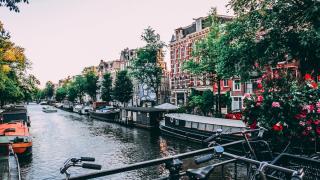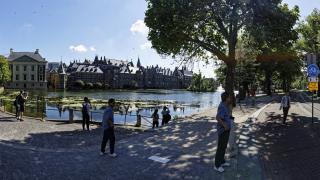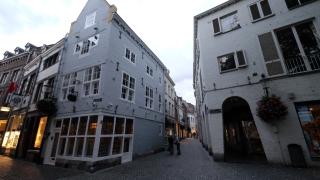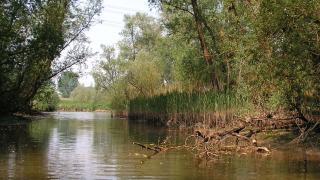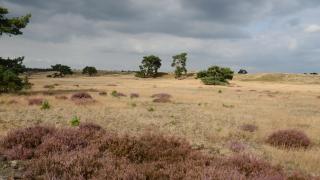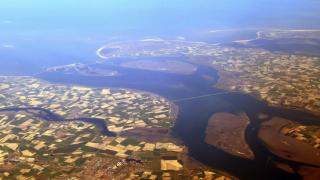First Impressions: Dutch Daily Life
Payment: Most shops accept only Maestro or Dutch debit cards. Credit cards are rarely used. Cash is still needed for public toilets, which usually cost €0.50-€1.
Business hours: Supermarkets close by 20:00. Smaller shops may close by 18:00, especially outside Amsterdam.
Transport: Biking is the main mode of transport. Expect crowded bike lanes and strict cycling rules. Trains and trams use the OV-chipkaart system; tap in and out for each journey.
Dining: Free tap water is available if requested. Tipping is not required but rounding up the bill is common.
Weather: Rain and wind are frequent. Locals cycle in all conditions. Always carry a raincoat.
Language: Dutch is spoken, but most people switch to English easily.
Culture: Dutch people are direct in communication. Punctuality is valued.
Amsterdam vs. other cities:
- Amsterdam: More international, higher prices, English widely used.
- Rotterdam, Utrecht, Groningen: More Dutch spoken, quieter, lower cost of living.
Housing Hunt: Finding Your Place
Apartments are the most common rental option in Dutch cities. Studio's and kamers (rooms) are popular with students. Shared flats (huisgenoten) are common in Amsterdam, Utrecht, and Rotterdam. Student housing is managed by organizations like DUWO. Waiting lists for student rooms can be over a year.
Rental process: Most landlords require a huurcontract (rental contract), proof of income, and a Dutch bank account. You need a valid residence permit or BSN (citizen service number). Deposits are usually one or two months' rent.
Costs: Amsterdam is the most expensive. Expect €1,200-€2,000 per month for a one-bedroom in the city center. Rotterdam and Groningen are cheaper, with rents from €800-€1,200.
Regional differences: Housing is scarce in Randstad (Amsterdam, Utrecht, The Hague, Rotterdam). Smaller cities like Eindhoven or Zwolle have more availability.
Tips: Always view the property in person. Never pay cash or via Western Union. Read contracts carefully—look for all-in (utilities included) or kale huur (bare rent). Subletting is often illegal. Registering at the address (inschrijven) is required for residency.
Getting Around: Bikes, Trains & More
Cycling is the main way to get around in Dutch cities. Most expats use a second-hand bike. Prices start at €50. Always lock your bike with two locks. Bike lanes are everywhere. Follow traffic lights and give way to trams. Fines for breaking bike rules start at €60. Public transport uses the OV-chipkaart. Buy it at stations or supermarkets for €7.50. Tap in and out at every journey, including buses, trams, and trains. Forgetting to tap out can cost up to €20. Trains connect all major cities. Amsterdam to Utrecht takes 27 minutes. Rotterdam to The Hague is 25 minutes. Avoid rush hour (07:00-09:00, 16:00-18:00). Trains and buses are crowded then. During Dutch holidays, expect delays and packed carriages. Regional buses may run less often on Sundays. In smaller towns, cycling or local buses are best. Download the NS and 9292 apps for real-time travel info. Always check for planned track works, especially on weekends.
Money Matters: Paying Like a Local
Dutch shops and supermarkets rarely accept Visa or Mastercard. Maestro and Dutch debit cards (pinpas) are standard. Many expats open a Dutch bank account within two weeks. ING, ABN AMRO, and Rabobank are common banks. Online banking is the norm; most services are in Dutch and English. Cash is less common in cities. Some cafés, markets, and public toilets still require coins. Always carry €1 and €2 coins for emergencies. Contactless payment (pin/contactloos) is widely used. Apple Pay and Google Pay work with Dutch accounts. Tikkie is a popular app for splitting bills among friends. Tipping is not required. Locals round up or leave small change in cafés and taxis. In restaurants, 5-10% is appreciated but not expected. ATMs (geldautomaten) are easy to find in city centers. Withdrawals may cost €2-€4 with foreign cards.
Culture Codes: Fitting In & Thriving
Dutch communication is direct. Locals say what they mean, even at work or with strangers. Feedback is often blunt, not rude. Making friends takes time. Many Dutch join clubs (verenigingen) for sports, music, or hobbies. Popular options: football, hockey, rowing, and choir. Annual fees range from €100-€400. Most socializing happens in small groups or at home, not in bars. Language: Most Dutch speak English fluently, especially in cities. Still, learning basic Dutch helps with integration. Free language cafés (taalcafés) run weekly in libraries. Dutch courses cost €200-€500 for 10-12 weeks. Cultural events: Celebrate King’s Day (April 27) with orange clothes and street markets. Join Sinterklaas parades in November-December. Try oliebollen (fried dough balls) at New Year. Many towns have kermis (funfairs) in summer. Integration tips: Be punctual. Always schedule social visits in advance. Bring your own birthday cake to work. Respect bike lanes and local customs. Summary: Directness, club memberships, and local traditions shape expat life in the Netherlands.
Smart Survival: Pro Tips & Quick Wins
Business hours: Most Dutch shops close by 18:00. Supermarkets may stay open until 20:00. Plan shopping early, especially on Sundays.
Public toilets: Toilets in train stations, parks, and city centers usually cost €0.50-€1. Carry coins. Free options are rare outside large stations.
Weather prep: Dutch weather is unpredictable. Pack a waterproof jacket, layers, and sturdy shoes. Rain is common year-round. Wind can be strong, especially in coastal cities like Rotterdam and The Hague.
Seasonal highlights: Tulip season lasts mid-March to mid-May. Visit Keukenhof or bike through Bollenstreek for peak blooms. Book tickets early—weekends are crowded. King's Day (April 27) brings nationwide street parties; wear orange. In December, try oliebollen at winter markets.
Quick win: Always check NS (Dutch Railways) for train delays before travel. Use the 9292 app for real-time public transport info.
